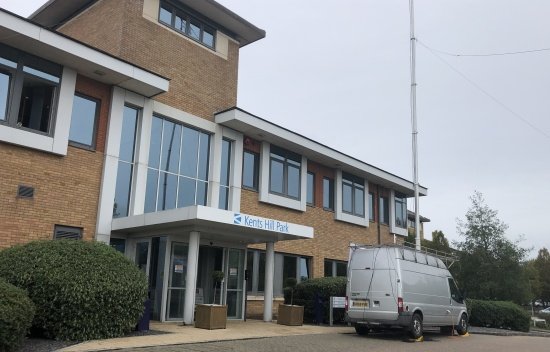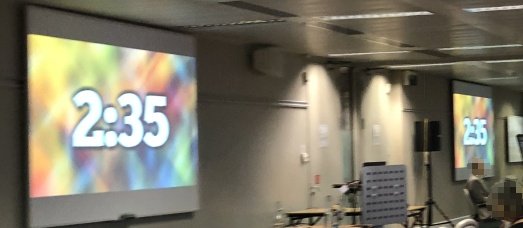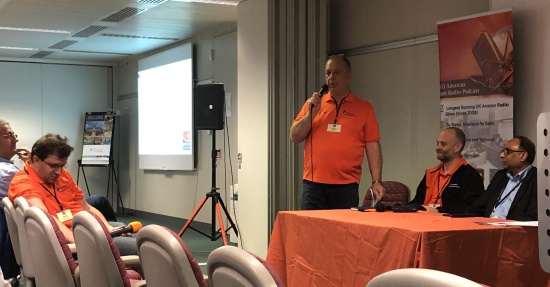This year’s RSGB Convention took place on Saturday the 12th and Sunday the 13th of October 2019, at the Kents Hill Park Training and Conference Centre in Milton Keynes.
Pete M0PSX from Essex Ham brings us the following report:
First off, well done to the RSGB team for organising this event – no mean feat… and also well done to the team at CambHams for the huge amount of work that their team put in to support the event – from running the station from Flossie at the front of the building, to providing sound and vision across the five lecture rooms.
For those who’ve not been before, the two-day event is a mix of the following:
- Presentations and talks simultaneously taking place in five lecture rooms, loosely divided into “HF/DX”, “VHF & Above”, “General”, “Contest” and “AMSAT”
- RSGB Construction Competition
- UK exams at all 3 levels, plus US exams
- Raspberry Pi Workshop
- A Buildathon run by Steve Hartley G0FUW
- AMSAT AGM
- Martin Lynch tables (sponsors of the event), plus a presence from Yaesu, Icom and Kenwood
- RSGB Bookstall
- A room of Special Interest Group displays
- Plenty of quiet corners to have a natter over a tea or coffee
- A formal dinner on Saturday night (plus some informal dinners offsite)

For me, it was a non-stop two day experience – catching up with many of the people I’ve been in contact with over the last year, seeing some familiar faces, and attending lectures. Some hot topics were discussed too, including: Introduction of a new entry-level licence, the urgent need to get new blood into the hobby, what happened to the “Beyond Exams” talk, ideas around rebranding the hobby, the new RSGB Workshop group, tutor support, and a look at whether clubs need to “grow, merge or disband”… The need for change was a constant theme, both during the various presentations, and in many of the huddles dotted around the venue.
Here is a short summary of the talks that I attended:
Apollo 50 and Return to the Moon
This was the first session I went to on Saturday morning. The session was presented by Pat Norris, who was one of the team at Houston during the Apollo 11 mission. An excellent session giving an overview of the Apollo mission, the landing 50 years ago, the Russian effort in getting to the moon, and next steps in the space program. An excellent insight with behind-the-scenes photos and videos.
BBC Relay Station on Ascension Island
A series of photos from inside the BBC South Atlantic relay station, from Steve White G3ZVW. A fascinating look at the antenna array and transmitters, plus a summary of how the station was maintained. I’m from a broadcast background, so this one was of special interest to me.
RSGB Exam Update
Presented by Tony Kent G8PBH from the RSGB’s Exam Standards Committee. This was an overview of exam activities, including the rollout of the 2019 syllabus and the revised structure of the group (including the new Exams and Syllabus Review Group). Some notes:
- The stats for exams from Jan to Sep 2019 were presented, plus the stats for the first full month of the new syllabus. With only 13 exams (29 candidates) taking place in September, Tony reported that it’s too early to make any judgement base on this limited data.
- Takeup of the online exams is only running at around 25%, which appears to be lower than the RSGB would like. Several questions were asked about online exams, and handling Internet dropouts during exams
- One member of the audience asked for the RSGB’s comments about rumours of a possible new entry-level, or fourth-level exam. The response was that this was nothing to do with the RSGB ESC, and is apparently a “discussion that other people are having”. (More: A Proposal for a Beginner Amateur Licence)
- RSGB is recruiting for members to join ESRG (Exams and Syllabus Review Group).
- The direct-to-Full exam and syllabus has been delayed, due to the re-org/recruitment of EG to ESRG
Disappointing that there was no tutor session this year – just one talk on exams (compared to three training & exam sessions last year). Could the RSGB’s apparent lack of interest in supporting and talking to its volunteer trainers signal that change is in the air? Could a new entry-level exam, remote online exams and a theory-based direct-to-full exam reduce the need for tutors and clubs?
Any comments? Feel free to chat in our HamTrain (for Trainers) Group or our new HamChat (Future of the hobby) Group.
The Future & Growth of Amateur Radio
Presented by new RSGB Board member Kamal Singh M0IOV, this offered a refreshing view on the state of amateur radio, and the problems facing it. Surprisingly honest, the presentation outlined the problems, the missed opportunities, and the need for change. Some memorable highlights:
- Once we had many famous amateurs, a high profile and reputation for innovation. “Have we lost the technical edge?” Kamal doesn’t blame the Internet, but our ability to adapt, and that we missed the third Industrial Revolution
- Relevance is our Achilles heel. We’re seen as out-dated, and we didn’t keep up with the tech trends
- Warnings about the danger of limiting our boundaries with statements like “it’s not real radio”, “this isn’t what amateur radio is all about”, “this isn’t how do do things”
- Barriers: Licensing and hardware cost are limiting uptake of amateur radio
- Are we too “insular, niche and aloof”? Do we need to become more “integrated and broad-minded?”
- Key message: “Relevance, Visibility, Appeal”
- Our opportunity is to capitalise on the 4th Industrial Revolution, which will include automated vehicles, drones, sensors, smart cities and IoT
Comments from the audience included:
- Is the term “radio” outdated? Would “Wireless Communication” be more apt?
- A suggestion that the RSGB rebrand to “The Communication Society of Great Britain”
Some interesting observations from John Regnault, the RSGB’s VHF Manager in the audience: We should not keep doing “more of the same”. How are we seen in other people’s eyes? Does CW, voice and vintage military equipment at field days “sell us”. “1-to-1 personal communications without a service provider”.
See also: Blog entry from Michael G0POT
Any comments? Feel free to chat in our new HamChat (Future of the hobby) Group.
Meet The RSGB Board
A series of short updates from various RSGB Board Members.
Noteworthy were comments that there is a need to get new blood in (2,000 new RSGB members each year). Suggestions of using the path of least resistance to acquire them (Men in Sheds, NRC visitors, CB, 4-by-4, Aviation and Ex-Service people.)
Last year, members were given the opportunity to ask a panel of board members their questions or raise their concerns. I personally didn’t attend last year, but reports from those who attended last year’s session indicated that the RSGB didn’t come out of it very well. It’s been noted on social media that although the session was videoed, unlike the other conference videos it’s not been released, and apparently isn’t likely to be released (same as the 2018 Tutor forum!).
RSGB may have discovered that open forums don’t do them any favours, so they opted for an attempt at a bizarre Board-member speed-dating session, where small groups of members could approach Board members at circles of chairs around the room to quietly ask questions, before rotating to visit other board members when a buzzer sounded.

From those I spoke to, this just didn’t work, but of course it was a great way for the RSGB to ensure that member concerns weren’t discussed openly in front of the whole audience, that the board responses were limited to a small audience, and that questions and answers were not recorded, documented or likely to appear in the public domain.
Any comments? Feel free to chat in our new HamChat (Future of the hobby) Group.
Writing for all variants of Radcom
Run by Elaine G4LFM, one of the two-person team responsible for the Society’s monthly magazine and online siblings. A good solid overview of Radcom, Radcom Plus and Radcom Basics, and how to write content and submit photos. A key point raised by Elaine is that those who write for club newsletters, websites and blogs can easily create content for Radcom, that Elaine and Giles are there to help and to fill in knowledge/skills gaps that a prospective author may have, and that there are cash payments for articles that although won’t make you rich, could go towards a new radio. Questions from the floor, taken by the BBC’s Jim Lee, largely centred around why Radcom doesn’t make an appearance in shops (or in online magazine portals), and what to do with old issues (doctor’s surgeries?)
More details & getting started with Radcom content: Information for authors
ARISS Operations
Sadly, ARISS lead Ciaran Morgan M0XTD was unable to attend, so a video of the recent schools contact with a Devon primary school was played. Plenty of questions from the audience about the setup required to make contact, and the activities in classrooms in the 12 months prior to an ARISS contact. A shame that Ciaran wasn’t there to provide an update on ARISS recent and planned activities, but an interesting and lively session with lots of information from various folk involved with giving school kids the once-in-a-lifetime chance to speak to an astronaut – one of our biggest “selling points”
Grow, Merge or Disband Your Club
Probably the highlight of my weekend. Run by the ICQ Podcast team, this was a panel of two ICQ presenters, two RSGB Board members (Ian Shepherd and Kamal Singh), plus Richard G4JJP (author of a controversial article in the June 2019 Radcom suggesting a change to club structures)

To be honest, I’m still digesting the contents of this talk and reviewing four pages of copious notes taken. There’s a lot to be said about this session – far too much for this summary. A few of the points I underlined:
- “Hubs not clubs”
- “Club baggage”
- “Hub” vs “Virtual clubs”
- “Should the RSGB be a hub?”
- To Google: “Disintermediation”, “centre set” “closed set” (bounded set?)
- A mention for the “Brickworks” scheme (that didn’t launch at the Convention)
- Some RSGB regional teams issue a “regional newsletter”
- Top-down vs Bottom-up approach
- Some interesting thoughts on youth access to amateur radio
- Clear divisions between single stand-alone clubs, and those acting as “hubs” to a greater or lesser extent
It was great that the efforts of Essex Ham members was acknowledged, and it was very rewarding that both Richard and the ICQ team highlighted Essex Ham as positive examples of the hub model. Positive mentions too for CambHams and Suffolk RED. RSGB also acknowledged that virtual clubs are “starting to appear”
This is a subject I’m very keen to get back to – and I strongly advise anyone with an interest in clubs to watch/listen to the ICQ Podcast’s coverage of this session, which will hopefully appear in the coming days.
Were you there? Feel free to chat in our HamClubs (club support group), or our new HamChat (Future of the hobby) Group.
See: ICQ Podcast homepage
Summary
Again, well done to the organising team at RSGB, to ML&S for sponsoring it, to everyone else who presented or helped out, and to CambHams for supporting the event. Especially fitting that one of the CambHams team (Rob M0VFC) won a Yaesu FT-818 in the raffle. Well done Rob!
An honourable mention to RSGB’s Graham Murchie G4FSG – The 2019 Convention was the last one to be organised by Graham, who now steps down from organising the event. Well done Graham – great work!
Thanks to everyone who took their time to say “hello” – for me, it was a non-stop weekend. When I wasn’t in a lecture room, I was chatting, catching up, and having some very enlightening conversations.
The urgent need for “change” was a constant theme, and something we all need to consider if the hobby is to survive. I’ll be expanding on some of these topics in the next few days, with an interesting interview to follow soon!
(Views are my own, and not necessarily the views of Essex Ham)
Pete M0PSX


The RSGB race to the bottom continues apace.
For the first time in many years attending the convention , I got the impression that the RSGB are actually starting to take the whole problem a little more seriously.
There were faint signs of this 2 years ago in Nick Henwood’s talk on clubs but this year they seem to have finally grasped some of the issues, so well done to them for making a start and to Kamal for elucidating them so eloquently.
Whether it is too late or not remains to be seen. My concern is that with probably 90% of Amateurs being over 60 that we might lose out to time. I hope not…
Part of the problem lies with so many Amateurs who seem to take the line that, as long as the bands hang around long enough before I die, I don’t care what happens after that…
Agreed on all counts – Kamal’s talk was certainly a breath of fresh air. I’d like to hope that RSGB prioritises getting that session’s video out, takes sounds from the members about its content, and listens to the voices of the membership. I heard some encouraging noises from several members and volunteers largely along the “adapt or die” line seeded by Nick Henwood’s “Break The Mould” talk two years back.
Is there time? Yes, but it needs to be used wisely and surgically. There are a lot of passionate and proactive people out there. A combination of channeling that energy, listening to the innovators, and being brave enough to challenge the traditional views, could see some genuine change which might snowball when others see change gaining traction.
From my perspective, all I see is effort being made to reorganise, consolidate positions and batten down the hatches. Several potentially game-changing initiatives in recent years all seem to have stopped, been forgotten, run out of steam or, more recently, been killed due to key personnel walking away. I’m apparently not alone in feeling that making entry to the hobby harder and trying to increase the progression ‘failure rate’ may be an own goal. Over the last year, there appears to have been a lot of rearranging of deckchairs. Groups for youth, training and monitoring have been dismantled or rebranded, others have had reshuffles or focus changes (ARDG, EG/ESRG). Following a structure refresh for Strategy recently, there’s another refresh due in January presumably keeping everyone busy (Service & Delivery teams, anyone?)
Always worth a watch at times like this: https://www.youtube.com/watch?v=YawagQ6lLrA
Pete
Agreed wholeheartedly. The rearranging the deckchairs has been going on even longer than that though!
I remember around 1991, the RSGB promoted Project YEAR (Youth into Electronics via Amateur Radio) which, while very ‘worthy’, was so out of touch with real schools and real youngsters, it was untrue.
I was an original Novice Licence instructor back then and the whole course was just too complex and unrelated to how kids learned in schools even then… (but they did get a whole 3 watts of 70cms once they passed it though!)
What was most concerning back then is that the society didn’t appear to listen to people like me who were teachers in ordinary schools at that time.
This is the first time I have felt vaguely positive about the future for the hobby in many years, though I am long enough in the tooth to know that actions will speak louder than words…
Kamal Singh is going to be a key player in the RSGB. I truly hope he gets the real support he desperately needs…
Interesting indeed. Nice write up Pete. I didn’t go, of course, as I went QRT last year and didn’t renew my RSGB membership. I can’t help thinking that RAs are on a hiding to nothing eventually. In my case, it was a case of antenna size and housing covenant restrictions, not to mention not wanting to impose an antenna farm on the neighbours, some of whom are so close on this estate that I could (literally) lean out of the window and shake hands. It wasn’t just that, as I tried several different forms of vertical, “long” wire and dipole but was totally defeated in the end by the outrageous noise levels that I was getting here.
On paper, I’m reasonably competent with a key (in an offline or “classroom” environment) but just get too nervous on the air for CW to be of any use to me, so the S/N advantage wasn’t much help.
I threw any amount of money at the hobby in an attempt to get “up to date” with digital modes of all kinds in an effort to overcome the noise, but none of them rubbed my rhubarb. I guess I just wanted to key up and chat like I used to in the old days. My problem; I know it may not be typical. I tried network radio, but that was just a diverting novelty for a while.
Still, The Norwich Club is great for me. Weekly meetings, a lot of very good lectures, good Skype talks and hook-ups worldwide, plenty of outside activities and social events. At least I have that to look forward to.
Good luck to the rest of you and I hope it works out for you all.
73, de Steve, G4GHO